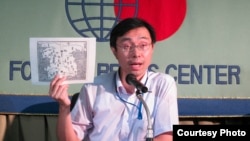TOKYO — Japan has returned its ambassador to South Korea after recalling him over a territorial dispute that involves an island in the Sea of Japan. In Tokyo there are still signs that both countries remain far apart on the issue.
Japan’s ambassador to South Korea has returned to Seoul. He was recalled earlier this month after South Korean President Lee Myung-bak’s visit to a disputed island in the Sea of Japan triggered a diplomatic crisis.
The island is called Takeshima in Japan and Dokdo in South Korea.
The Japanese government sent a letter to South Korea on Tuesday, proposing to take the matter to the International Court of Justice (ICJ). But Japanese media reported Wednesday the letter was on its way back to Tokyo.
At a Japan Foreign Ministry press briefing, Assistant Press Secretary Masaru Sato said South Korea has rejected similar offers twice in the past, but he expressed hope that Seoul would finally accept to defer the matter to the ICJ.
"Things have changed. Korea is now advocating global Korea, and it is a responsible member of the United Nations. If they believe their claim is justifiable, they should fairly and unequivocally accept Japan’s proposal," said Sato. "If they say no, we are seeking an amicable, peaceful solution. There is no way to force them to agree to our proposal, but it is time for Korea to accept our proposals."
Sato explained the Japanese government is preparing to take additional measures to deal with the crisis, depending on the way South Korea responds to its proposal. But he also stressed that Japan is eager to find a peaceful settlement that will prevent the issue from affecting bilateral ties.
“Japan-Korea relations are very important, not only economically, but also to maintain peace and stability in the region. We do not want a deterioration of bilateral relations, and that is exactly why we would like to take an appropriate legal response. We believe that Korea’s reactions have been very, very unusual, and we can say that it is a diplomatic aberration in terms of international practice," Sato explained.
He also reiterated Japan’s claim to the island, saying historical documents confirm that Japan established its sovereignty over Takeshima by the mid 17th century, before incorporating it into one of its prefectures in 1905.
He said the United States has acknowledged the territory is an integral part of Japan by denying a South Korean attempt to claim it after World War Two.
Seoul’s prompt rejection of the Japanese letter is likely to send shockwaves through diplomatic circles in Tokyo. Japan’s national broadcaster NHK has called it an “unprecedented response” in terms of diplomatic protocol.
With another territorial dispute with China lingering on over islands in the East China Sea, Prime Minister Yoshihiko Noda’s administration could find itself under renewed pressure from nationalist groups to adopt a stronger stance.
Japan’s ambassador to South Korea has returned to Seoul. He was recalled earlier this month after South Korean President Lee Myung-bak’s visit to a disputed island in the Sea of Japan triggered a diplomatic crisis.
The island is called Takeshima in Japan and Dokdo in South Korea.
The Japanese government sent a letter to South Korea on Tuesday, proposing to take the matter to the International Court of Justice (ICJ). But Japanese media reported Wednesday the letter was on its way back to Tokyo.
At a Japan Foreign Ministry press briefing, Assistant Press Secretary Masaru Sato said South Korea has rejected similar offers twice in the past, but he expressed hope that Seoul would finally accept to defer the matter to the ICJ.
"Things have changed. Korea is now advocating global Korea, and it is a responsible member of the United Nations. If they believe their claim is justifiable, they should fairly and unequivocally accept Japan’s proposal," said Sato. "If they say no, we are seeking an amicable, peaceful solution. There is no way to force them to agree to our proposal, but it is time for Korea to accept our proposals."
Sato explained the Japanese government is preparing to take additional measures to deal with the crisis, depending on the way South Korea responds to its proposal. But he also stressed that Japan is eager to find a peaceful settlement that will prevent the issue from affecting bilateral ties.
“Japan-Korea relations are very important, not only economically, but also to maintain peace and stability in the region. We do not want a deterioration of bilateral relations, and that is exactly why we would like to take an appropriate legal response. We believe that Korea’s reactions have been very, very unusual, and we can say that it is a diplomatic aberration in terms of international practice," Sato explained.
He also reiterated Japan’s claim to the island, saying historical documents confirm that Japan established its sovereignty over Takeshima by the mid 17th century, before incorporating it into one of its prefectures in 1905.
He said the United States has acknowledged the territory is an integral part of Japan by denying a South Korean attempt to claim it after World War Two.
Seoul’s prompt rejection of the Japanese letter is likely to send shockwaves through diplomatic circles in Tokyo. Japan’s national broadcaster NHK has called it an “unprecedented response” in terms of diplomatic protocol.
With another territorial dispute with China lingering on over islands in the East China Sea, Prime Minister Yoshihiko Noda’s administration could find itself under renewed pressure from nationalist groups to adopt a stronger stance.





